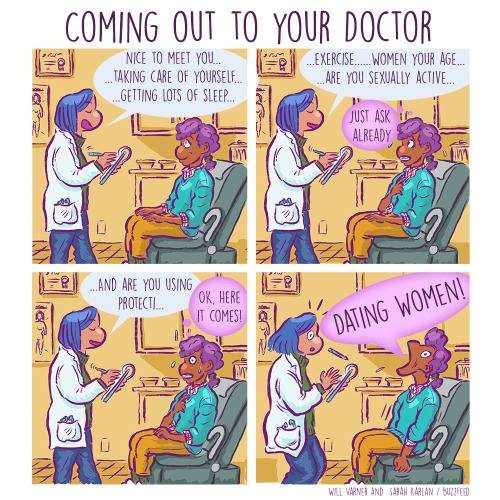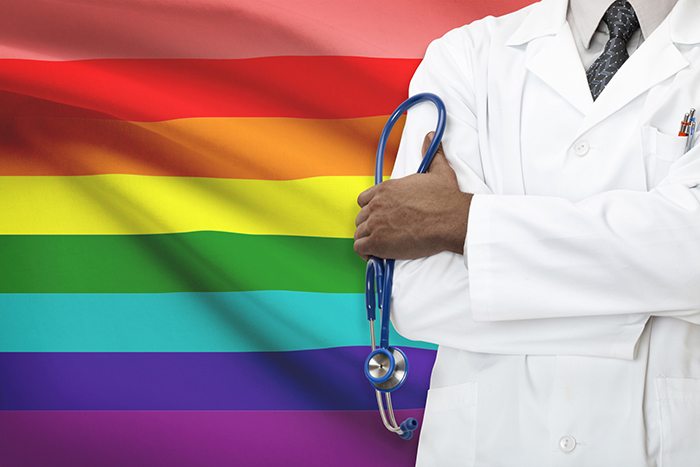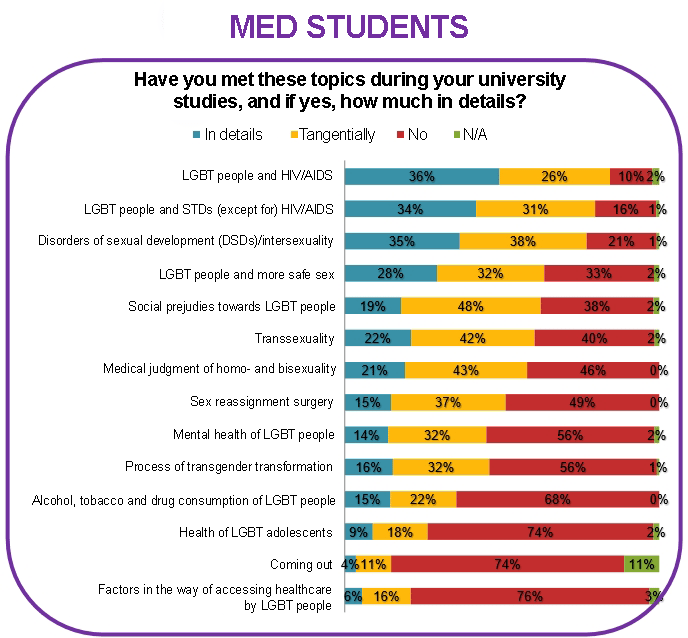A visit to the gynecologist is definitely not something we do gladly. Usually the examinations there are a necessary evil that we fear, even if we have no reason to. This weird anxiety can be even stronger for lesbian and bisexual women, since we have no idea what they think about us, non-heterosexual people. QLit did a bit of investigation on what to expect from Hungarian doctors.
We asked 6 lesbian and 1 bisexual women about their experiences. They have visited both free clinics and private practicioners.
Assumed heterosexuality
“The first time I visited the lady doctor was because of an infection. Her first question was if I use protection with my partner.” - stated Sára, adding that the doctor was obviously thinking of a condom for men. Another participant, Martina told the following story: “They asked if I have an active sexual life. I told them that yes, I do. To which they said: it’d be much more convenient for me to use a spiral or a pill for protection, assuming that I use a condom. Then I quietly said I don’t need either one of those, since I have a girlfriend.”

6 out of our 7 participants stated that their doctors haven’t even thought about their patients potentially being gay. This might be surprising, especially in Budapest, since a lot of LGBTQ people choose to move to the capital, escaping their small towns or villages.
There even was a person whose doctor refused to believe that being a lesbian is something that “lasts forever”. After telling them that she sleeps with women, the doctor said after some hesitation:
When you change your mind and decide to have kids, come back to talk about planning a family.
Kata thinks the doctor’s opinion was that sexuality is a choice and they probably didn’t even think it’s possible that a woman can have children without sexual intercourse with a man. “But you’ve been with a man, right?” Questions like this are so common, 4 of our participants have been asked the same thing, without reference to the family questions. Panni, who turned to the doctor because of an infection, was instantly asked to have her partner’s penis treated with medication as well.
From being cool to homophobia
All the answers included being scared to come out to their doctors because of the possibility that they might be homophobic. Erika, a bisexual who has been living in London for 5 years now, said that none of her visits and coming outs have been handled unprofessionally. Although in some cases she didn’t even mention having sex with girls, because she also had men partners. “I do the same at home, at least I have a cover.” - she confessed.
The other lesbians we asked have also only talked about their sexual orientation if it was necessary for an illness or contraception. “Are we running away from boys?” -asked Enikő’s male doctor (around the age of 50), when she declined his offer to start using pills. Enikő said yes, leaving it to the doctor. She said she only comes out to medical workers, including her GP, if it is absolutely necessary for some reason. She was not the only one with this opinion.
Out of our participants, Réka was the only one who had to face obvious homophobia. “When they found out that I’m lesbian, they flipped out. They said that I should decide if I’m a boy or a girl. So I told them to back the f*ck off...”
On the contrary, Panni, who is working for a multinational corporation has told us a funnier story. “When she asked what kind of protection me and my partner use, I blushed and said none, I only have sex with girls, her answer was:
Alright, Pannika, I understand that you are a lesbian, but sometimes you still stuck something up there, right?
This conversation took place while discussing a medical problem. Then Panni got advice on how to clean her sexual toys properly. That’s when it got funny: the doctor’s phone rang, it was her husband calling for some little thing. After hanging up, she said with a sigh: “Well, at times like this I get jealous of lesbians...”
Looks matter
1 out of 7 ladies told us about a strong homophobic reaction: Réka, who identifies as a butch. The others are either traditionally feminine or simply not very masculine, which could be the reason why they didn’t have to face any confrontation. Furthermore, Réka was the only one who was never thought to be heterosexual. Lipstick (typically feminine) lesbian Dalma confessed that during her examination, both the doctor and their assistant were surprised to find out that “all this makeup is hiding a lesbo”.
Doctors left alone
A medical examination like this can be difficult both physically and emotionally, and it’s not very easy for the doctors either. It would be extremely important in the 21st century to teach young med students about how to communicate with people whose sexual orientation and identity is different than the average.

QLit successfully got the notes from SOTE’s ethical course for med students, which only implies orientations other than heterosexual, saying no word about LGBT people.
In a chapter called “Communication about sexual problems” the professor claims that for a smooth sexual life it is unavoidable to live accordingly to orientation, gender identity and gender role. They also quoted World Health Organization’s definition of sexual health, “which is based on a healthy body, having necessary gender functions for a person’s age, and the realization of sexual rights.”
All this information makes it clear that they only use indirect indications about LGBT people when giving advice about doctor-patient communication. Furthermore, there is no general information about the background of sexual minorities, which would be essential to understanding intimate problems of the body and soul.
Háttér Society’s broad LGBTQ health research which was published in 2015, also stated that 90% of Hungary’s medical students have only heard mentions of LGBTQ people in relation with HIV/AIDS (which leads to negative assumptions), and 74% of them haven’t even heard about important matters such as coming out or the difficulties of healthcare for us. This leaves doctors to be left alone to their own conclusions and experiences, since Hungarian healthcare has no protocol for these situations. Unless they have a close lesbian/gay acquaintance, they have no proceedings for treating LGBTQ patients (other than how they have to respect all their patients), and how not to hurt them unintentionally with words.

In conclusion, Hungary definitely needs to educate the medics about the LGBTQ+ community, especially gynecologists, where sexuality is definitely a matter. It’s important to note that the people we interviewed are constantly looking for new gynecologists, since they are not satisfied with the treatment they receive.
Finally, some advice: if you meet any kind of discrimination, don’t forget to report to the doctor’s superiors! Also, you can get free quality help from Equal Treatment Authority.
Despite the negative examples, please don’t miss the gynecological exams, because it’s necessary for your own and your partner’s health, and it can be a life matter! No matter if you only have sex with girls, you can still develop serious illnesses even without having symptoms for a long time. It is recommended to visit your lady doctor not only for contraception or another problem, but for yearly screenings as well (including cervical cancer, HPV-virus, cysts, hormones).
Translated by Éva Csermendy

